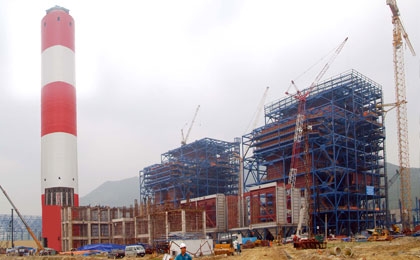Charm offensive to attract power FDI

illusstration photo
The moves are part of a new strategy drafted by the Ministry of Industry and Trade (MoIT) to lure foreign direct investment (FDI) in the power sector as Vietnam still faces severe electricity shortages.
In the drafted strategy, which was sent to local authorities and ministerial agencies for comment, the MoIT proposed the government to decide a ‘reasonable’ guarantee of foreign exchange for the 750 megawatt O Mon 2 project in Mekong Delta’s Can Tho city and 2,400MW Vung Ang 3 project in central Ha Tinh province as an “immediate” measure to lure FDI into the power sector.
The government will select foreign investors for both projects under the build-operate-transfer model through bidding, according to the government’s electricity master plan during 2011-2020. O Mon 2 is planned to be operational by 2016 and the Vung Ang 3 after 2020.
Even though the MoIT has not proposed a specific foreign exchange guarantee ratio for these projects, this is positive news to encourage foreign investors to invest in the power sector.
“A ‘reasonable’ guarantee proportion of foreign exchange will encourage foreign lenders to provide developers with loans to implement O Mon 2 and Vung Ang 3,” MoIT said in the draft.
According to the prime ministerial Document 1604/TTg-KTN dated September 12, 2011, foreign exchange guarantee only extend to 30 per cent of annual revenues earned by a foreign-invested power plant after deducting expenses incurred in Vietnamese dong.
However, foreign investors complained that such current government guarantee for foreign exchange were very difficult for foreign lenders and developers as they were concerned about foreign exchange convertibility and availability.
“This does not provide foreign developers and foreign lenders sufficient comfort. The only power projects of any size in Vietnam that have been financed to date have been financed on the basis of 100 per cent foreign exchange guarantee,” said Tony Foster, managing partner of Freshfields Bruckhaus Deringer LLP and head of the Vietnam Business Forum’s infrastructure working group.
Before the introduction of the document 1604, the 1,200MW Nghi Son 2 project in central Thanh Hoa province, which would be tendered, had received 100 per cent foreign exchange guarantee, said Foster.
Obviously, if O Mon 2 and Vung Ang 3 are not granted with the same incentives, it will be very hard for investors to borrow money for developing these projects.
“If they have a choice of a project that has a 100 per cent foreign exchange guarantee and one with a 30 per cent foreign exchange guarantee, then if everything else is roughly equal they will fund the former. As a result no project with a 30 per cent foreign exchange guarantee is likely to be financeable in the near future in the commercial market,” said Foster.
But the foreign exchange guarantee is just a short term measure to encourage FDI into Vietnam’s power sector. In the long term, Vietnam needs to establish an independent electricity distribution mechanism, according to the draft strategy.
According to the MoIT, state-run Electricity of Vietnam (EVN), the largest supplier and sole electricity distributor at present, has a monopoly and every power investor must negotiate electricity selling prices with EVN.
“This monopoly mechanism meant some foreign investors and EVN could not reach price agreements. Thus, it leads the slow pace of power development plans,” said MoIT.
Vo Van Tai, chief executive officer of PHI Asia Holdings - a subsidiary of US-based PHI Group which is investing in two power projects in Quang Tri and An Giang provinces, said: “I believe that EVN itself has to restructure to become a strong group with sound, transparent and efficient operations. And when the company has to do such things, the restructuring of its branches or subsidiaries has to follow the principle of efficiency basing on competitiveness.”
“Generally speaking, the robust restructuring of EVN toward efficiency with full accountability and transparency can solve the problem of a real competitive electricity generation market regardless of the absolute monopoly of EVN or not,” he added.
What the stars mean:
★ Poor ★ ★ Promising ★★★ Good ★★★★ Very good ★★★★★ Exceptional
 Tag:
Tag:
Related Contents
Latest News
More News
- Foreign leaders extend congratulations to Party General Secretary To Lam (January 25, 2026 | 10:01)
- 14th National Party Congress wraps up with success (January 25, 2026 | 09:49)
- Congratulations from VFF Central Committee's int’l partners to 14th National Party Congress (January 25, 2026 | 09:46)
- 14th Party Central Committee unanimously elects To Lam as General Secretary (January 23, 2026 | 16:22)
- Worldwide congratulations underscore confidence in Vietnam’s 14th Party Congress (January 23, 2026 | 09:02)
- Political parties, organisations, int’l friends send congratulations to 14th National Party Congress (January 22, 2026 | 09:33)
- Press release on second working day of 14th National Party Congress (January 22, 2026 | 09:19)
- 14th National Party Congress: Japanese media highlight Vietnam’s growth targets (January 21, 2026 | 09:46)
- 14th National Party Congress: Driving force for Vietnam to continue renewal, innovation, breakthroughs (January 21, 2026 | 09:42)
- Vietnam remains spiritual support for progressive forces: Colombian party leader (January 21, 2026 | 08:00)






















 Mobile Version
Mobile Version